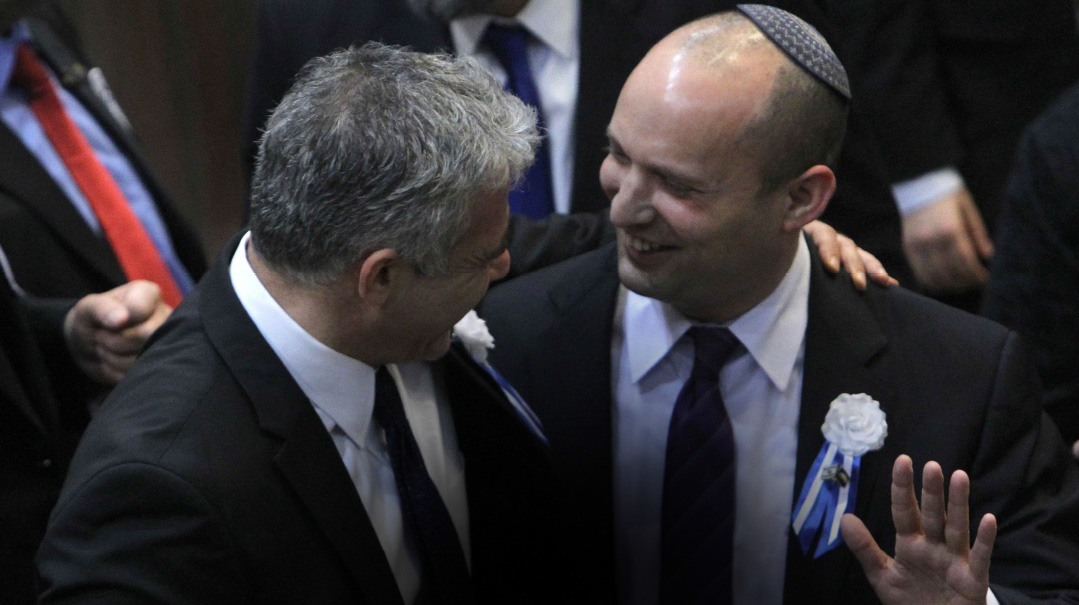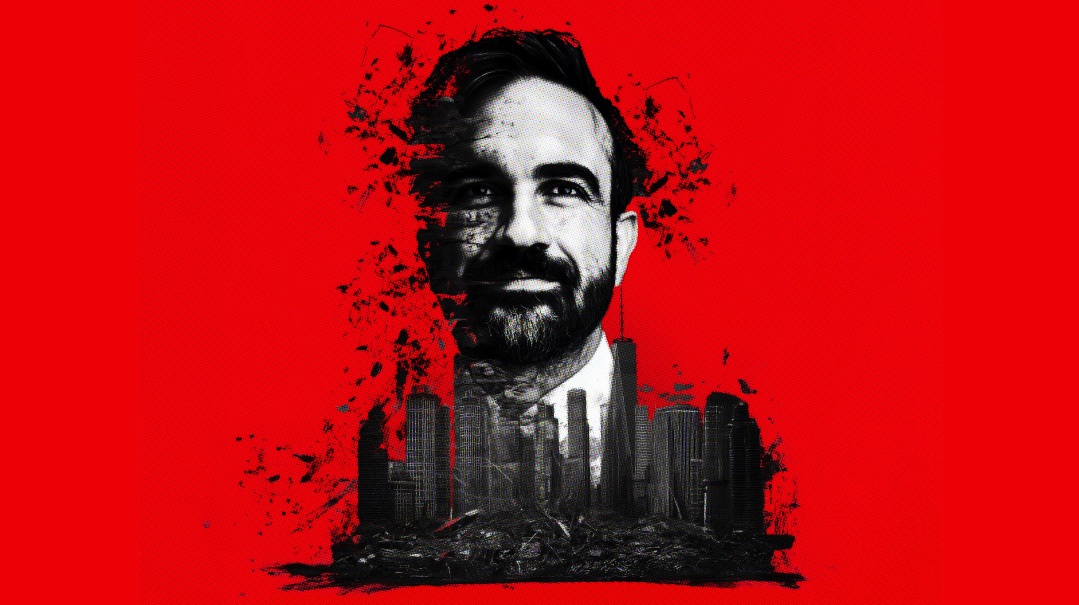Double Trouble

Could a Lapid-Bennett government destroy Israel's religious status quo?

Photos: Flash90
Seventy-five years after the State of Israel’s founding fathers set the country’s religious status quo in stone, is the putative Lapid-Bennett coalition about to commit unprecedented vandalism on the Chief Rabbinate’s control over halachic standards?
Weary with the endless political deadlock, after Bibi failed at his fourth attempt to form a government, Israelis have just handed the keys to the strangest coalition ever to receive the presidential mandate. Covering the political spectrum from left-wing Meretz to Bennett’s right-wing Yamina, the potpourri was cobbled together with the prime purpose of getting Netanyahu out of power. With Bibi now seemingly out of the way, the only thing that binds the motley group together now is a collective wish to radically liberalize everything from giyur to appointing rabbis.
As of this writing, it’s unclear whether Naftali Bennett and Yair Lapid will succeed in forming a government. Even if they do, it remains to be seen who will serve as religious affairs minister. Bennett and Lapid are trying to walk a fine line between appeasing their supporters on the religious affairs issues and trying to bring the chareidi parties into the governing coalition, to give it much-needed stability and broaden its support.
One figure who prefers to keep the chareidim out of the new government is New Hope MK Ze’ev Elkin, who wants to put the religious Zionists in charge of issues of religion and state. Yamina, meanwhile, has put forward reformist Matan Kahana as its favored candidate for the religious affairs post. According to sources within the chareidi parties, Yamina has agreed with Lapid and Lieberman that on issues of religion and state, the government will follow the positions of the religious Zionist rabbinic group Tzohar, which is considered more liberal than the Rabbanut. Among their aims: approving the Nissim Commission recommendations on halachic conversion, ending the rabbinate’s monopoly on kashrus certification in accordance with the positions of Tzohar, and appointing a religious Zionist figure to the post of chief rabbi.
According to the Nissim Commission recommendations (first presented to the government in 2018), conversions won’t be performed by the Rabbanut but by a new and independent conversion authority answering directly to the prime minister’s office. Conversions not performed by the new body won’t be recognized by the State of Israel either for religious purposes or for civil purposes (e.g., right to citizenship per the Law of Return). The Nissim recommendations would prevent Reform conversions from being recognized, but the fact that the new conversion authority would be independent from the Rabbanut — and above all, political, as the prime minister will decide who leads it — makes it a trap that endangers the future practice of Judaism in the State of Israel.
The prime minister wouldn’t just appoint the conversion authority’s head, but the rest of its members as well. What this means is that the dayanim who sit on it could in theory all be Orthodox, but they would all owe their appointments to a commission headed by the prime minister in which the Orthodox would be in the minority, opening a potential entrance for the Reform. Let it be noted that the chief rabbis would be ipso facto members of the commission, but would not hold the power of veto.
Will They Bring in the Chareidim?
Although Lapid and Bennett have worked hard to assemble this coalition, issues of religion and state have been a key area of disagreement between the liberal and conservative elements in the so-called change bloc. Saar and Bennett see the chareidim as natural allies. Lapid and Avigdor Lieberman are opposed to the chareidi lifestyle and are seeking to change it, or at least stop funding it. Lieberman’s party, Yisrael Beitenu, nominally right wing, often votes with the center-left bloc on issues such as public transportation on Shabbos and other bills critical to preserving religious practice.
Similar disputes will rage when it comes to funding for the chareidim, who, in the event of a change government being formed, will sit in the opposition, at least initially. Lieberman, who has been floated for the finance minister post in the change government, is demanding cuts in funding for yeshivos, as well as in child tax credits, and wants to aggressively encourage chareidi employment. Lapid, as finance minister in a previous government, already cut funds for yeshivos and child tax credits. Bennett, for his part, opposes this, in hopes that the chareidim will join the government at a later stage, so the coalition doesn’t have to rely on the Arab Ra’am party.
For the most part, Bennett’s strategy is to try to find a way to preserve the status quo. As a senior Yamina figure put it, the aim is to find a compromise that Yamina can live with, but also gives Yisrael Beitenu, Labor, and Meretz something to show their voters.
According to reports, Bennett and Lapid are considering the possibility of offering the religious affairs post to former Shas head Eli Yishai, in hopes of winning the support of the chareidi parties.
Last Thursday, New Hope chairman Gideon Saar met with Rav Meir Mazuz, rosh yeshivah of the Kisse Rahamim yeshivah and the spiritual mentor of Eli Yishai, who was also present at the meeting. This gave rise to rumors that Gideon Saar is interested in bringing in Eli Yishai as an outside appointment as a signal to the chareidim, while giving Matan Kahana, Yamina’s candidate for the post, the chairmanship of the Knesset Finance Committee in compensation.
The goal: to win chareidi support for the new government and bolster the right-wing presence in the coalition. This means providing the chareidim with a clear demonstration that the new government will not be hostile to their interests. Furthermore, although Saar and Bennett have no expectations of winning over Aryeh Deri with his right-wing masorti base, they do think it possible to cause UTJ to cross the lines.
Sad Precedents
In the Justice Ministry, there’s a feeling that with the chareidi parties in the opposition and shorn of influence, the High Court will be able to crack down on chareidi interests without fear. “Bad cases make bad law,” said the American jurist Oliver Wendell Holmes. Anyone looking for an example of how eager the High Court is to strike at the chareidi community’s interests is invited to listen to the following story, as it was explained to us by Yehuda Yifrach from Makor Rishon, a religious Zionist newspaper.
Several years ago, two small towns, Rosh Pinah and Yesod Hamaalah, decided to take issue with the Religious Affairs Ministry’s rules and regulations for appointing municipal rabbis. The councils of the two towns complained that their municipal rabbis, who had been in their posts for decades, earned high salaries way out of line with the services they provided. The official duties of a municipal rabbi — issuing kashrus certificates, marriage licenses, and overseeing funerals — are very limited. The rest of the religious services — mikveh, eruv, and management of shuls — are provided by the local religious council, not the rabbi.
The two local authorities brought a lawsuit to the High Court. They sought discretion in the decision as to whether towns had to appoint municipal rabbis at all; and if they did decide to appoint one, to be able to set his salary themselves. They also sought the power to fire incumbent rabbanim or at least reduce their salaries. Basically, they were petitioning the High Court to throw out the Religious Affairs Ministry’s regulations for the elections of municipal rabbis, which they argued had been drawn up without their consent.
The Religious Affairs Ministry caved to this pressure and reached an agreement with the local authorities that the salary of town rabbanim would be decided by agreement between the religious affairs minister and local municipalities. In the event that no agreement was reached, the rabbi’s default pay would be 50 percent of his present salary. The rabbi could stay on with half salary and fill in the cutback by becoming a rosh yeshivah or head of a mechinah.
What the Religious Affairs Ministry didn’t expect was that this compromise would produce a torrent of new lawsuits to the High Court. Rosh Pinah, one of the two towns initiating the action, dropped its suit after an agreement was reached to allow the incumbent rabbi to stay in his post until retirement.
However, two judges at the time, Dorit Beinisch and Edna Arbel, were able to to establish two crucial precedents based on the changed Religious Affairs regulations. First, the principle that the appointment of a municipal rabbi is a privilege and not an obligation, and that a local authority can appoint one or not as it chooses. The second, that an authority would be able to decide the extent of the rav’s duties, as well.
Profound Disrespect
The judiciary forged another precedent in the case of the religious council of Shlomi against its town rav, Rabbi Shlomo Elharar. When it reduced his salary by half, due to supposed budget constraints, Rav Elharar took the Shlomi religious council to the National Labor Court.
The Shlomi religious council’s central claim was that the previous High Court rulings allowed it not only to avoid appointing a local rav or appoint one to a part time position, but also to cut the incumbent rav’s salary. Rav Elharar, for his part, argued that that part of the judges’ decision had been an incidental remark in the verdict (obiter dictum), not in the central verdict itself (ratio decidendi), while High Court rulings only constitute precedents if they’re central to the verdict. He further argued that the judges had only allowed the local authorities to choose not to fill a vacancy or fill it with a part-time post, but not to retroactively cut the salary of an incumbent rav.
Rav Elharar also argued that it wasn’t acceptable for a rav to undergo the lengthy, arduous hiring process, settle in the town to devote his whole life to it, and then have the local council suddenly decide to cut his salary. Even the lowest ranking municipality workers, he said, have labor laws protecting them from arbitrary pay cuts. In the end, the National Labor Court did rule that Rav Elharar had to be indemnified, but rejected his arguments in principle. Judge Ronit Rosenfeld ruled that the local authority is entitled to cut the rav’s salary. As a result of this precedent, Bat Yam and Hadera decided to appoint new rabbanim at 50 percent and 20 percent of the normal salaries, respectively.
Then came the case of Rabbi Yigal Kaminetzky, who served as rav of Gush Katif for 20 years, and after the Disengagement received reduced wages as rav of a kehillah in the yishuv of Nitzan. Rav Kaminetzky sued the state in the National Labor Court, arguing that the Disengagement had infringed on his rights, as without it he would have been entitled to serve as rav of the village until retirement age.
The state’s response included several arguments, one of which was interesting: “The appellant was not employed as a civil servant. His employer was the local religious council, and it was they who were responsible for his salary. His post was terminated with the Disengagement, in which the religious council effectively ceased to exist.” The labor court accepted the arguments of the state, and rejected Kaminetzky’s appeal.
“The story here isn’t money, because responsibility for the rav’s salary is shared between the local council and the religious affairs minister,” says Rav Shlomo Elharar, who lost his battle to the Shlomi religious council. “The story here is political. I believe the Justice Ministry wants to take complete control of the Rabbanut and make rabbanim dependent on politicians and officials, so they won’t be able to fight for halachah.
“I want you to understand the problem. The head of the religious council is a political figure, and the rav of the city can’t be subordinate to him. Imagine that the head of the council wants to appoint a crony as mashgiach, or wants to grant a kashrus to a business he has ties to, but the business doesn’t meet the rav’s criteria. He can just tell the rav, ‘If you don’t fall in line, I’ll cut your salary.’ He can give the excuse that budget cuts were needed.”
“This is a profound disrespect for the rabbinate,” says a figure in the Rabbanut. “In every city there’s a list of public positions that can’t be considered part-time, and the rav has become the lowest priority. The High Court rulings have created a grim reality. The Religious Affairs Ministry never dreamed that’s what would happen as a result of its agreement to change the regulations.”
The chareidi parties watching the change bloc coalition taking shape would be wise to bear these thoughts in mind.
(Originally featured in Mishpacha, Issue 860)
Oops! We could not locate your form.













